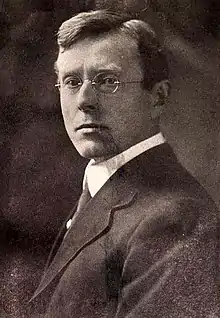Frank Parkhurst Brackett
Frank Parkhurst Brackett (1865 – 1951) was an American professor of astronomy.
Frank Parkhurst Brackett | |
|---|---|
 | |
| Born | June 16, 1865 Provincetown, Massachusetts |
| Died | September 3, 1951 (aged 86) Los Angeles County, California |
| Alma mater | Dartmouth College (M.A.) |
| Employer | Pomona College |
| Spouse(s) | Lucretia Burdick |
| Parents | |
He was born in Provincetown, Massachusetts,[2] the eldest son of Solomon Hoyt Brackett and Mary A. née Thomas. The following year his father taught school at Stoneham, then in 1868 he was named principal of the High School in Keene, New Hampshire. He later became Professor of Natural Sciences at St. Johnsbury Academy in Vermont.[1] Frank matriculated to Dartmouth College, where he paid his way working various jobs, then graduated with a B.S. in 1887 with Phi Beta Kappa honors. The same year he moved to Los Angeles, California and accepted a teaching position at a private school.[2]
In 1888, at the behest of Reverend Charles B. Sumner, he helped found a small Christian school in Pomona that would serve as the foundation of Pomona College. Bracket initially served as an instructor in mathematics and Latin at the school.[2] He was married to the local watercolor artist Lucretia Burdick on August 15, 1889.[3] In time the couple would have two sons. The eldest, Frederick Sumner Brackett, was born August 1, 1896[4] and would become a biophysicist. The younger son, Frank Parkhurst Brackett Jr., became a chemist and a supervising executive.[2]
Frank was awarded a Master of Arts degree from Dartmouth College in 1890.[2] The same year he became professor of astronomy at Pomona.[3] To instruct his students, Brackett relied on a six-inch telescope that was acquired second-hand. A college observatory based on his design was completed in 1908 and Brackett became its director. This structure was generously funded by a former student, Llewellyn Bixby, from the class of 1901.[5] It was dedicated the Frank P. Brackett Observatory in his honor.[6]
During the November months at Pomona College, Brackett organized several observing campaigns with his students to perform meteor counts of the Leonids.[7] In 1910, Brackett became professor of mathematics at the University of California.[8] The following year he joined Charles G. Abbot on the Smithsonian Expedition to Algeria as part of an ongoing effort to measure the solar constant.[9] Two years later he joined another Smithsonian expedition that ascended Mt. Whitney to measure nocturnal radiation from the atmosphere.[10] After World War I began in 1914, he took a leave from his teaching position to participate on the Commission for Relief in Belgium. He was given permission by the German occupation forces to visit the Royal Observatory of Belgium in 1916 and report on its condition.[11] In 1917, he worked on the Selective Service Act in the Los Angeles area.[12]
Brackett penned the History of Pomona Valley, California, which was published in 1920.[13] During the 1920s he joined the R.O.T.C. and was trained at Angel Island.[12] He was awarded an honorary PhD from Dartmouth in 1927 on the occasion of the 40th reunion of his class.[2] The solar eclipse of April 28, 1930 passed over California, and Pomona College organized an expedition to observe the event.[14] He retired from teaching at Pomona in 1933.[2] In 1944, he published his reminiscences of the college in a work titled Granite and Sagebrush.[15] He was awarded an honorary PhD from Pomona in 1947 on the 60th anniversary of its founding.[2]
Brackett Field in Los Angeles County is named after him.[16]
References
- Brigham, William Tufts (1882), The Fifth Report of the Secretary of the Class of 1862 of Harvard College, Harvard University, p. 119.
- Whitney, Walter T. (December 1951), "Frank Parkhurst Brackett, 1865-1951", Publications of the Astronomical Society of the Pacific, 63 (375): 287, Bibcode:1951PASP...63..287W, doi:10.1086/126397.
- Marquis, Albert Nelson, ed. (1912), Who's Who in America, 7, p. 224
- Brackett, Frederick Summer (1922), Visible and Infra-red Radiation of Hydrogen, Johns Hopkins university, p. 162.
- "1908", Pomona College Timeline, retrieved 2020-10-31.
- "The Frank P. Brackett Observatory Dedication", Popular Astronomy, 17: 14–19, January 1909, Bibcode:1909PA.....17...14..
- Brackett, F. P. (February 1901), "Observation of Leonids at Pomona College, Claremont, California", Publications of the Astronomical Society of the Pacific, 13 (77): 14, Bibcode:1901PASP...13...14B, doi:10.1086/121408.
- A Thousand American Men of Mark To-day, 1917, p. 152.
- Brackett, F. P. (June 1912), "Astronomical Expedition to Algeria", Publication of the Pomona College Astronomical Society, 1: 2.1–2.8, Bibcode:1912PPCAS...1b...1B.
- Brackett, F. P. (October 1913), "The Smithsonian Expedition to California for Measurement of Nocturnal Radiation", Publication of the Pomona College Astronomical Society, 3: 10–19, Bibcode:1913PPCAS...3...10B.
- Brackett, F. P. (October 1916), "A visit to the Royal Observatory of Belgium During the German Occupation", Publication of the Pomona College Astronomical Society, 6: 11–19, Bibcode:1916PPCAS...6...11B
- "Guide to the Frank P.Brackett Papers", Online Archive of California, retrieved 2020-10-31.
- Brackett, Frank Parkhurst (1920), History of Pomona Valley, California, Los Angeles, CA: Historic Record Company, LCCN a32002325.
- Brackett, F. P. (June 1930), "The Pomona College Eclipse Expedition", Publications of the Astronomical Society of the Pacific, 42 (247): 149, Bibcode:1930PASP...42..149B, doi:10.1086/124021.
- Brackett, F. P. (1944), Granite and sagebrush: reminiscences of the first fifty years of Pomona College, Ward Ritchie Press.
- Blackstock, Joe (July 21, 2014), "Brackett Field's naming a bit of a puzzle", Daily Bulletin, retrieved 2020-10-31.
Further reading
- "Search results for "Brackett, F. P."", Astrophysics Data System (ADS), retrieved 2020-10-31.
- "Dr Frank Parkhurst Brackett", Find-a-grave, retrieved 2020-10-31.